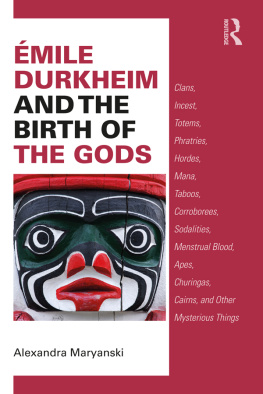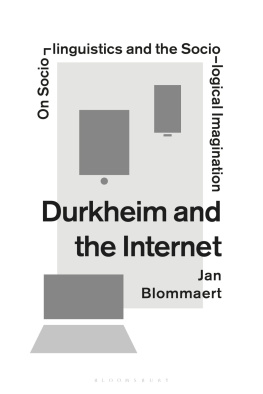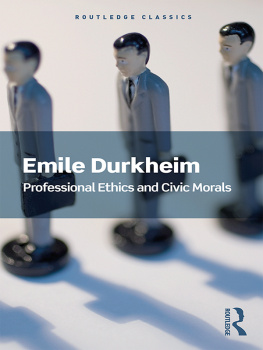
DURKHEIM
AND POSTMODERN CULTURE
COMMUNICATION AND SOCIAL ORDER
An Aldine de Gruyter Series of Texts and Monographs
Series Editor
David R. Maines, Wayne State University
Advisory Editors
Bruce Gronbeck Peter K. Manning William K. Rawlins
David L. Altheide and Robert Snow, Media Worlds in the Postjournalism Era
Joseph Bensman and Robert Lilienfeld, Craft and Consciousness: Occupational Technique and the Development of World Images (Second Edition)
Valerie Malhotra Bentz, Becoming Mature: Childhood Ghosts and Spirits in Adult Life
Herbert Blumer, Industrialization as an Agent of Social Change: A Critical Analysis(Edited with an Introduction by David R. Maines and Thomas J. Morrione)
Dennis Brissett and Charles Edgley (editors), Life as Theater: A Dramaturgical Sourcebook(Second Edition)
Richard Harvey Brown (editor), Writing the Social Text: Poetics and Politics in Social Science Discourse
Norman K. Denzin, Hollywood Shot by Shot: Alcoholism in American Cinema
Irwin Deutscher, Fred P. Pestello, and Frances G. Pestello, Sentiments and Acts
Joo-Hyun Cho, Family Violence in Korea
Bruce E. Gronbeck, Rhetoric and Socioculture
Pasquale Gagliardi (ed), Symbols and Artifacts: Views of the Corporate Landscape(paperback)
J. T. Hansen, A. Susan Owen, and Michael Patrick Madden, Parallels: The Soldiers Knowledge and the Oral History of Contemporary Warfare
Emmanuel Lazega, The Micropolitics of Knowledge: Communication and Interaction in Work Groups
David R. Maines (editor), Social Organization and Social Process: Essays in Honor of Anselm Strauss
David R. Maines, Time and Social Process: Gender, Life Course, and Social Organization
Peter K. Manning, Organizational Communication
Stjepan G. Metrovi, Durkheim and Postmodernist Culture
R. S. Perinbanayagam, Discursive Acts
William K. Rawlins, Friendship Matters: Communication, Dialectics, and the Life Course
Vladimir Shlapentokh and Dmitry Shlapentokh, Ideological Trends in Soviet Movies
Jim Thomas, Communicating Prison Culture: The Deconstruction of Social Existence
Jacqueline P. Wiseman, The Other Half: Wives of Alcoholics and Their Social-Psychological Situation
DURKHEIM
AND POSTMODERN CULTURE
Stjepan G. Metrovi
About the Author
Stjepan G. Metrovi, is a native of Zagreb, Croatia, and is Professor of Sociology at Texas A & University. Widely published in scholarly journals, he is the author of Emile Durkheim and the Reformation of Sociology (1988) and The Coming Fin de Sicle (1991).
First published 1992 by Transaction Publishers
Published 2017 by Routledge
2 Park Square, Milton Park, Abingdon, Oxon OX14 4RN
711 Third Avenue, New York, NY 10017, USA
Routledge is an imprint of the Taylor & Francis Group, an informa business
Copyright 1992 by Taylor & Francis.
All rights reserved. No part of this book may be reprinted or reproduced or utilised in any form or by any electronic, mechanical, or other means, now known or hereafter invented, including photocopying and recording, or in any information storage or retrieval system, without permission in writing from the publishers.
Notice:
Product or corporate names may be trademarks or registered trademarks, and are used only for identification and explanation without intent to infringe.
Library of Congress Cataloging-in-Publication Data
Metrovi, Stjepan Gabriel.
Durkheim and postmodern culture / Stjepan G. Metrovi.
p. cm. (Communication and social order)
Includes bibliographical references and index.
ISBN 0-202-30439-6. ISBN 0-202-30440-X (pbk.)
1. SociologyPhilosophy. 2. Durkheim, Emile, 1858-1917.
3. PostmodernismSocial aspects. 4. Culture. 5. Romanticism.
I. Title. II. Series.
HM24.M47215 1992
301.01dc20
92-21616
CIP
ISBN 13: 978-0-202-30440-3 (pbk)
To my darling Amber,
the love of my life
Contents
The present work is an elaboration of my previous efforts in Emile Durkheim and the Reformation of Sociology (1988) and The Coming Fin de Sicle (1991) to demonstrate Durkheims neglected relevance to the postmodern discourse. My aims include finding affinities between our fin de sicle and Durkheims fin de sicle, and connecting the contemporary themes of rebellion against Enlightenment narratives found in postmodern culture with similar concerns found in Durkheims sociology as well as in his fin de sicle culture. I hope that these aims will contribute to Durkheimian scholarship as well as to the postmodern discourse.
The distinctive aspects of the present study flow from the focus on culture, communication, and the feminine voice in culture. I approach Durkheim as a fin de sicle student of culture, and apply his insights to our fin de sicle culture. Furthermore, because Durkheim claimed that culture is comprised primarily of collective representations, he was a forerunner of the current, postmodern concerns with communication. Because Durkheim shall be read in the context of his fin de sicle, this book shall lead to the conclusion that Durkheim was a kind of psychoanalyst such that society is the patient, culture comprises the symptoms, and the sociologist must decipher, decode, and even deconstruct collective representations. Yet, the Durkheimian deconstruction I am proposing here is unlike the postmodern deconstructions, which criticize and tear apart a text without substituting a better meaning or interpretation. Some postmodernists claim that such exercises are liberating, while others regard them as nihilistic. Some would deny that anything like a postmodern culture could exist. Consider the anticultural stand in the following claim made by Jean Baudrillard, who is often referred to as the high priest of postmodernism:
I went in search of astral America, not social and cultural America, but the America of the empty, absolute freedom of the freeways, not the deep America of mores and mentalities, but the America of desert speed, of motels and mineral surfaces. (1986:5)
My focus on postmodern culture is made in deliberate contradistinction to Baudrillard and other postmodern writers. On the one hand, such a focus violates the rules of the postmodern rebellion against origins, cultural roots, or any foundations for the circulation of fictions in society (Rosenau 1992:19). On the other, it is commensurate with postmodern claims of offering liberation from oppressive narratives, freedom, and choice (Bauman 1991). At this point, I wish to indicate merely that my focus on postmodern culture is not an accident.
Feminism has emerged as a dominant voice that has accompanied postmodern discourse. I intend to show that Durkheim was always mindful of the left-handed, feminine aspects of society and culture, and that he sought to balance these with the right-handed, masculine aspects that came to dominate modern social arrangements. But again, Durkheims seemingly Jungian approach to culture shall be pursued in order to distinguish it radically from Baudrillards postmodern approach:






